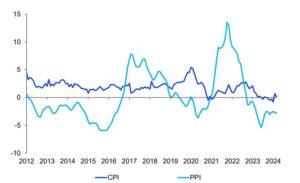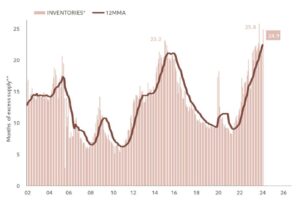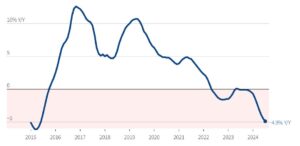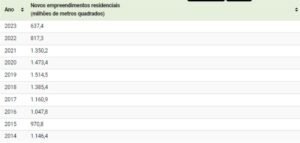China's real estate crisis: impacts and measures
Understand more about the real estate crisis in China, what the market data reveals and measures adopted for retention.
China’s real estate crisis began in 2021 and has impacted the local and global economy ever since. At its peak, the Chinese real estate sector once accounted for around a quarter of the country’s GDP. Today, China’s real estate prices fall periodically, registering in June 2024 the fastest drop in 9 years.
In this article, we’ll understand what caused this collapse, what the current situation is, what the retention measures are and more.
How did the real estate crisis begin in China?
The Chinese real estate crisis began mainly through monetary policies granted to local developers. State-owned banks made low interest rates available to companies to boost housing construction around the country. However, this accelerated expansion resulted in debt for companies that financed large projects, often without enough capital to cover the costs. As fewer buyers acquired new properties, the sector began to face a severe crisis.
Below, you can follow the peak of real estate construction in China in 2021 and the decline in the following years:

Source: KPMG
To make ends meet, developers have increased property prices, but the result on the market has been the opposite: the high prices have reduced demand within the country. This generated a chain effect that you can follow below:
1 – Restrictive policies for developers
The local government has imposed restrictions on the indebtedness of construction companies, limiting their debts according to the proportion of their assets.
2 – Pressure on companies’ cash flow
Real estate companies faced difficulties in obtaining new financing and refinancing their debts due to restrictive policies.
3 – Oversupply
Large-scale construction and an aging population have resulted in an increase in the supply of real estate in the country. See the latest data on China’s real estate stock:

Source: ICIS
4 – Crisis in one of the largest real estate companies
Evergrande collapsed financially due to its indebtedness. This caused a series of problems in the credit market, damaging banks and investors. Other developers, such as Country Garden, also weakened after the start of the crisis.
In August 2023, Evergrande’s shares plummeted 79%. Country Garden reported a loss of US$6.7 billion in the first half of the same year.
5 – Distrust in the real estate sector
Thousands of real estate projects have been halted or delayed in China. This has increased distrust in the sector, as many Chinese have not received their homes.
6 – Falling property values
This scenario shattered the image of real estate as a safe investment for the Chinese. High supply and shrinking demand have led to a rampant reduction in prices.
See below for a graph showing this decline, especially from 2021 onwards:

Source: Reuters
Read also:
Fiscal policies and the foreign exchange market: understanding their impacts and influences
The current Chinese real estate crisis
Sales in the real estate sector continue to fall. Currently, the reduction is 20.2% compared to last year. In investment, there was also a decline of 9.8% in the first four months of 2024, while new construction starts fell by 24.6%. According to Reuters, new home prices also fell for the 13th consecutive month, with a 0.7% drop.
Data from the Central Bank of China shows how much people expect property prices to fall. In August 2024, 23.2% of Chinese still believed that values would continue to fall in the third quarter of the year, a record since the data became available in 2013. With the crisis of domestic confidence and the belief that prices will continue to fall, there is less incentive for buyers to purchase real estate at the moment. This creates uncertainty about when the crisis will end.
According to Goldman Sachs, the total value of unsold or unfinished homes in China is around 30 trillion yuan, or 4.1 trillion dollars. The institution says that more than 967 billion dollars may be needed to reduce the housing supply to pre-collapse levels.
In terms of millions of square meters built, new residential developments in China fell by 58%, from 1,515 million m² in 2019 to 637 million m² in 2023. See below:

Source: Visual Capitalist
Chinese measures to contain the real estate crisis
The record housing supply is still affecting liquidity in the real estate sector and the Chinese economy, as the figures show. However, the local government is already working on measures to stabilize the market. The aim is to compensate for declining demand, slow the fall in prices and control the stock of unsold properties.
Among the main solutions announced by the Chinese government is a reduction in mortgage interest rates. The aim is to encourage the use of loans to boost real estate sales. China’s Central Bank has also announced the creation of a 300 billion yuan fund for affordable housing, a measure that seeks to increase demand for middle-class properties.
Finally, state-owned companies have also been looking to buy apartments in order to reduce the supply on the real estate market, in addition to the Country Garden liquidation hearing (which has been postponed until January 20, 2025).
For the future, expectations are still uncertain. There is no forecast for the real estate sector to return to pre-crisis levels. The Chinese government has already accumulated US$15 trillion in debts related to the pandemic and infrastructure. This puts pressure on public accounts and restricts the source of funding that could heat up the market again.
The impact of the Chinese real estate crisis on the global economy
China’s real estate sector accounts for a significant part of the country’s GDP. With a slowdown in this sector, the nation’s growth is also directly impacted.
This reduction in the economy influences global demand, especially for commodities (such as steel, soybeans and more). In the long term, these consequences could harm commodity-exporting countries like Brazil, a major trading partner of the Asian nation.
- Read also: Brazil’s role in China’s food security: a 50-year partnership
The economic slowdown in China also affects global supply chains. The country is a major manufacturing center and a drop in economic activity could impact nations that depend on Chinese products. Furthermore, in the event of a drop in Chinese exports and revenue, other nations may have to lower interest rates or adopt expansionary policies to mitigate the negative impacts.
The importance of hedging in this scenario
The uncertainty surrounding the Chinese real estate crisis has caused volatility in the commodities market. As this collapse can hit demand for products, the prices of raw materials are also changing across the globe.
In this scenario, hedging is an important tool that contributes to price protection. Contact a specialist at Hedgepoint and find out more about our hedging products that can help you manage commodity price risks.






